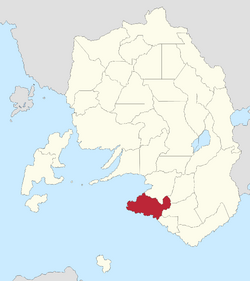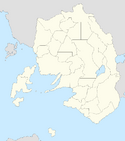Canaery: Difference between revisions
mNo edit summary |
m Text replacement - "Concilium Daoni" to "Conshilía Daoni" |
||
| (8 intermediate revisions by 2 users not shown) | |||
| Line 1: | Line 1: | ||
{{wip}} | {{wip}} | ||
{{Infobox settlement | |||
| name = Electorate of Canaery | |||
| | | native_name = | ||
| | | settlement_type = [[Government_of_Urcea#Crownland|Crownland of Urcea]] | ||
| image_skyline = | |||
| imagesize = | |||
| map_caption = Location of the Electorate of Canaery | |||
| image_flag = Canaery.png | |||
| | | image_map = Canmap.png | ||
| subdivision_type = Country | |||
| subdivision_name = [[Urcea]] | |||
| | | subdivision_type1 = | ||
| subdivision_name1 = | |||
| subdivision_type2 = | |||
| subdivision_name2 = | |||
| seat_type = Cathedral City | |||
| | | seat = [[Cana]] | ||
| leader_party = | |||
| leader_title = Governor | |||
| leader_name = Joanna Fel ([[Solidarity Party (Urcea)|S]]) | |||
| population_as_of = 2014 | |||
| | | population_total = 49,104,599 | ||
| | }} | ||
| | |||
| | |||
|[[Cana]] | |||
| | |||
| | |||
|[[ | |||
| | |||
| | |||
The '''Electorate of Canaery''' is one of three [[Government of Urcea#Crownland|crownlands]] of the [[Urcea|Apostolic Kingdom of Urcea]]. It was an electorate of the [[Holy Levantine Empire]], and it was acquired by the [[Apostolic King of Urcea|Urcean Crown]] in 1144, though it was not formally integrated into the crown of Urcea until 1589. It is the homeland of the [[Caenish people]]. Unlike the other two crownlands, Canaery is not considered an integral part of the realm according to the precedent set by the [[Golden Bull of 1098]], but it retains its place of precedence due to the historical connection it gives between [[Urcea]] and the [[Holy Levantine Empire]]. | The '''Electorate of Canaery''' is one of three [[Government of Urcea#Crownland|crownlands]] of the [[Urcea|Apostolic Kingdom of Urcea]]. It was an electorate of the [[Holy Levantine Empire]], and it was acquired by the [[Apostolic King of Urcea|Urcean Crown]] in 1144, though it was not formally integrated into the crown of Urcea until 1589. It is the homeland of the [[Caenish people]]. Unlike the other two crownlands, Canaery is not considered an integral part of the realm according to the precedent set by the [[Golden Bull of 1098]], but it retains its place of precedence due to the historical connection it gives between [[Urcea]] and the [[Holy Levantine Empire]]. | ||
| Line 57: | Line 29: | ||
== History == | == History == | ||
Canaery was, like much of [[Levantia]], settled by [[Gaelic people]] until the arrival of the [[Adonerii]] in the 800s BC. They established the city that would become known as [[Cana]], which was a major trading outpost due to the large natural harbor protruding into the [[Sea of Canete]]. | Canaery was, like much of [[Levantia]], settled by [[Gaelic people]] until the arrival of the [[Adonerii]] in the 800s BC. They established the city that would become known as [[Cana]], which was a major trading outpost due to the large natural harbor protruding into the [[Sea of Canete]] known as the Bay of Novec. | ||
== Geography == | == Geography == | ||
{{Template:Urcea geography sidebar}} | |||
Canaery is situated in the Caen Peninsula, a large landmass separating the Antonine Bay from the [[Sea of Canete]]. | |||
=== Cities and towns === | === Cities and towns === | ||
| Line 71: | Line 44: | ||
The [[Apostolic King of Urcea]] nominally rules Canaery as its [[Collegial Electorate|Prince-Elector]], but like the [[Urceopolis (Archduchy)|Archduchy of Urceopolis]] and [[Grand Duchy of Yustona]], the Electorate is fully integrated within [[Urcea]]. Like the Archduchy, the Electorate utilizes a near-fully parliamentary system, but unlike the Archduchy the Governor-General is not a non-partisan role. In the Electorate, the Royal Parliament of Canaery, lead by the Electoral Chancellor, selects a pool of candidates it would approve of as Governor-General - typically three to five candidates - and forwards them on to the [[Apostolic King of Urcea]] for selection. In this way, the government of Canaery more fully appears like other parliamentary systems, with a nominal executive appointed by the will of the Royal Parliament who exercises purely ceremonial functions. The Royal Parliament meets in Parliament House in Cana. | The [[Apostolic King of Urcea]] nominally rules Canaery as its [[Collegial Electorate|Prince-Elector]], but like the [[Urceopolis (Archduchy)|Archduchy of Urceopolis]] and [[Grand Duchy of Yustona]], the Electorate is fully integrated within [[Urcea]]. Like the Archduchy, the Electorate utilizes a near-fully parliamentary system, but unlike the Archduchy the Governor-General is not a non-partisan role. In the Electorate, the Royal Parliament of Canaery, lead by the Electoral Chancellor, selects a pool of candidates it would approve of as Governor-General - typically three to five candidates - and forwards them on to the [[Apostolic King of Urcea]] for selection. In this way, the government of Canaery more fully appears like other parliamentary systems, with a nominal executive appointed by the will of the Royal Parliament who exercises purely ceremonial functions. The Royal Parliament meets in Parliament House in Cana. | ||
== Politics == | === Politics === | ||
Canaery is considered to be solid [[Solidarity Party (Urcea)|Solidarity Party]] territory. [[Cana]] tends to be the most prominent battleground between Solidarity, various left-wing parties, and the [[National Pact (Urcea)|National Pact]]. As a consequence of Caenish identity, local parties adopt more overtly pro-Caenish tendencies, rhetoric, and divergent social and economic platforms from their national parties. As a result, candidates for [[Procurator]] tend to underperform in Canaery compared to their local party wing. For example, in the [[2025 Urean elections]], Solidarity won every single [[Conshilía Daoni]] seat in Canaery, but their vote total percentage was far higher than [[Livio Iarnán]]'s. The same was true in the [[2030 Urcean elections]], where he won only 56% of the vote despite another Solidarity sweep. | |||
== Sports == | == Sports == | ||
| Line 77: | Line 51: | ||
[[Category: Urcea]] | [[Category: Urcea]] | ||
[[Category: | [[Category: Subdivisions of Urcea]] | ||
[[Category: | [[Category:IXWB]] | ||
[[Category:Canaery]] | [[Category:Canaery]] | ||
[[Category: States of the Holy Levantine Empire]] | |||
Latest revision as of 14:02, 4 September 2024
This article is a work-in-progress because it is incomplete and pending further input from an author. Note: The contents of this article are not considered canonical and may be inaccurate. Please comment on this article's talk page to share your input, comments and questions. |
Script error: The module returned a nil value. It is supposed to return an export table.
Electorate of Canaery | |
|---|---|
 Location of the Electorate of Canaery | |
| Country | Urcea |
| Cathedral City | Cana |
| Government | |
| • Governor | Joanna Fel (S) |
| Population (2014) | |
| • Total | 49,104,599 |
The Electorate of Canaery is one of three crownlands of the Apostolic Kingdom of Urcea. It was an electorate of the Holy Levantine Empire, and it was acquired by the Urcean Crown in 1144, though it was not formally integrated into the crown of Urcea until 1589. It is the homeland of the Caenish people. Unlike the other two crownlands, Canaery is not considered an integral part of the realm according to the precedent set by the Golden Bull of 1098, but it retains its place of precedence due to the historical connection it gives between Urcea and the Holy Levantine Empire.
Etymology
Canaery shares the same basic root as the Sea of Canete, canto, in both contexts referring to a marginal section of a country or civilization. These terms were applied both to the sea and to the area around Cana due to their peripheral status within Adonerum. The earliest application of the terms is not known, and the development of canto to Canorium, the Great Levantine province, is similarly historically unclear. Contrary to popular opinion, the word Caenish or Caen is unrelated to the name Canaery and instead refers to Gothic tribal origins.
History
Canaery was, like much of Levantia, settled by Gaelic people until the arrival of the Adonerii in the 800s BC. They established the city that would become known as Cana, which was a major trading outpost due to the large natural harbor protruding into the Sea of Canete known as the Bay of Novec.
Geography
| This article is part of a series on the |
| Geography of Urcea |
|---|
 |
Canaery is situated in the Caen Peninsula, a large landmass separating the Antonine Bay from the Sea of Canete.
Cities and towns
Economy
In 2034-35, the Electorate of Canaery was calculated to have an approximate GDP of $2,248,106,751,418.
Demographics
Government
The Apostolic King of Urcea nominally rules Canaery as its Prince-Elector, but like the Archduchy of Urceopolis and Grand Duchy of Yustona, the Electorate is fully integrated within Urcea. Like the Archduchy, the Electorate utilizes a near-fully parliamentary system, but unlike the Archduchy the Governor-General is not a non-partisan role. In the Electorate, the Royal Parliament of Canaery, lead by the Electoral Chancellor, selects a pool of candidates it would approve of as Governor-General - typically three to five candidates - and forwards them on to the Apostolic King of Urcea for selection. In this way, the government of Canaery more fully appears like other parliamentary systems, with a nominal executive appointed by the will of the Royal Parliament who exercises purely ceremonial functions. The Royal Parliament meets in Parliament House in Cana.
Politics
Canaery is considered to be solid Solidarity Party territory. Cana tends to be the most prominent battleground between Solidarity, various left-wing parties, and the National Pact. As a consequence of Caenish identity, local parties adopt more overtly pro-Caenish tendencies, rhetoric, and divergent social and economic platforms from their national parties. As a result, candidates for Procurator tend to underperform in Canaery compared to their local party wing. For example, in the 2025 Urean elections, Solidarity won every single Conshilía Daoni seat in Canaery, but their vote total percentage was far higher than Livio Iarnán's. The same was true in the 2030 Urcean elections, where he won only 56% of the vote despite another Solidarity sweep.
Sports
Unlike much of the rest of Urcea, automobile racing - and particularly, the International Racing Federation - is a very popular sport in Canaery. Canaery has become known globally as something of a "best known secret" for producing skilled drivers. Canaery is also home of Saraçen Motors, a high-end automobile manufacturer which began as a method to fund a motorsport team.
